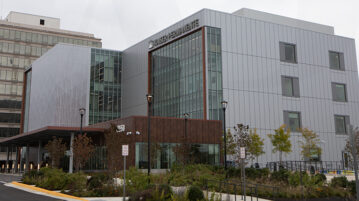By Carolyn Gorman, MD
Couples who enjoy a good sex life after 50 – the age that typically coincides with the onset of menopausal symptoms in women – tend to have one thing in common: very good communication. They are open in talking with one another about their sexual needs. And they focus on intimacy and sexual enjoyment, not solely on having an erection or orgasm.
Physical Changes in Women
Menopause brings many changes to a woman’s body, life, and sex life. Vaginal dryness and pain and a decreased libido can affect women at any age, but at the onset of menopause and later, vaginal dryness increases. This often leads to painful intercourse. The cause for dryness is a lack of estrogen, potentially resulting in a lack of desire.
Many women with vaginal dryness find relief through the use of lubrication. There are three kinds: water-based, silicone-based, and oil-based (massage oils or petroleum jelly) lubricants. Each has pros and cons, which you should discuss with your doctor.
Beyond lubrication, many women have the option of low-dose vaginal estrogen in a prescription-only cream, insert (ring), or pill. Studies show that using vaginal estrogen does not increase your risk of cancer recurrence if you have or have had breast cancer, but be sure to involve your oncologist in any discussion about vaginal estrogen.
A postmenopausal lack of vaginal lubrication may also lead to painful muscle spasms during intercourse, a condition known as vaginismus. A pelvic exam will rule out other issues (cysts, pelvic inflammatory disease, or vaginal atrophy), and physical therapy with a pelvic floor specialist can help you cope with these spasms.
As a “use it or lose it” organ, the vagina needs penetration after menopause, or it will tighten and shorten, causing issues later. Women who don’t have a sexual partner can consider the use of masturbation with an insertion toy to prevent vaginal changes.
Physical Changes in Men
Men also experience physical changes that can affect their sexuality as they age. One common challenge is erectile dysfunction (ED), which affects approximately 10 percent of men per decade of life (60 percent of men in their 60s, 70 percent of men in their 70s, etc.).
Medical conditions, particularly diabetes and heart issues, are a leading cause of ED, as are medications used to treat high blood pressure, pain, or prostate conditions.
Lifestyle can also play an important role. Common culprits that can restrict blood flow to the penis, thus affecting the ability to have and maintain an erection, include smoking, drinking more than two alcoholic beverages prior to sex, being overweight and sedentary, and eating less than the recommended daily servings of fruits and vegetables.
Adopting a healthier lifestyle lowers a man’s risk of ED by preserving erectile function. If you are experiencing erectile dysfunction, it’s important to talk with your doctor to discuss possible treatments, including medications, injections, and pumps.
Other Considerations for Men and Women
For both women and men, there are a variety of other health conditions common to aging that can also interfere with sex, such as chronic pain from arthritis, heart disease, stroke, dementia, depression, and surgery.
Communication is key, both with your doctor and your partner. Ask your doctor how an illness or surgery will affect your sexual enjoyment, and discuss strategies for coping. If you or your partner are suffering from arthritis, for example, you might experiment with different positions or use pillows to help ease pain or pressure.
If you have more than one sexual partner, it’s important to know that you could be at risk for a sexually transmitted infection (STI). In recent years, people over 45 have seen an increase in reported cases of gonorrhea, syphilis, and chlamydia, according to the American Association for Retired Persons. In addition, the number of older people with HIV/AIDS is growing. To protect yourself, always use a condom during sex that involves vaginal and anal penetration, and be sure to go for regular check-ups and testing.
Emotional Changes
Sexuality involves a delicate interplay between emotional and physical issues, and older couples may face stresses that can get in the way of a fulfilling sex life.
Changes in weight, skin, and muscle tone can lead some older people to feel less attractive to their partner, as can physical changes brought on by mastectomy, hysterectomy, or prostatectomy. Daily worries – surrounding retirement, illness, or changes in lifestyle – can also interfere with sex.
If you sense your partner pulling away, don’t just assume he or she is no longer interested in sex. Talk openly about your concerns and your desires. You might also consider sharing your concerns with a therapist (either alone or with your partner).
And be sure to bring your concerns to your doctor, since there’s a very good chance that he or she may be able to suggest a treatment that can help.
Your sexual life is part of your total health, affecting so much of your life – physically, emotionally, and mentally. Yes, aging is a factor in how you approach your sexuality. But with open communication with your partner and your doctor, you can enjoy a healthy sexual life at any adult age.
Find out more about how aging can affect your sexuality by visiting the website of the National Institute on Aging or the North American Menopausal Society.




